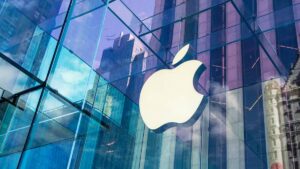eToro’s weekly Nasdaq focus: The going gets tougher as US tech stocks fall into a correction

Pic: Getty
The Nasdaq has entered correction territory, with the major tech index down more than 14 per cent from its high in November 2021.
Those falls have accelerated more recently, after another sharp 2.75% drop on Friday saw the Nasdaq finish around 7.5% lower for last week alone.
The fall in risk sentiment comes amid rising bond yields, a more hawkish stance from the US Federal Reserve and consistently high inflation.
As a result, investors are selling off risk assets as we see a rotation towards more cyclical areas of the market.
Taking advantage when things get rocky
The sharp falls make for tough going for US tech investors. But this market correction may also present opportunities for investors with a long term mindset — particularly for the big tech players, which have solid cash flows, large moats, and more attractive valuations.
This week, eToro released its global retail investor Beat survey, speaking to 8,500 investors in 12 countries, answering 26 questions. It gives a great insight into the mind of the retail investor.
According to the survey, technology continues to be the most popular sector, with 35% of Australians focusing on that field.
Although technology stocks may have a less rewarding year in 2022, most Australians appear to be focused on long-term growth, which is why it is still the most owned sector.
The main concern among retail investors, according to the report, is inflation.
Given that the US inflation rate is at 40-year highs, this is unsurprising.
However, we believe that the inflation outlook is nearing its peak, and that investors will start to be less concerned throughout the year.
Microsoft bids for Activision
The week’s biggest news has to be Microsoft’s US$69 billion bid for video game developer Activision Blizzard. The landmark deal would be Microsoft’s largest-ever acquisition ever and the largest M&A deal in technology history.
In addition, it demonstrates Microsoft’s financial strength and big tech’s financial flexibility, given that the acquisition represents only half of the company’s US$130 billion cash pile.
The deal accelerates the rise of gaming in the last three years and big tech’s desire to position itself in the metaverse.
Acquiring Activision will enable Microsoft to expand its gaming efforts outside its already illustrious game segment, as well as drive its metaverse ambitions.
Microsoft is arguably in one of the best positions to fully exploit the metaverse through its cloud services, hardware, and potentially, content.
The transaction is expected to close in July 2023, subject to regulatory and shareholder approval.
SOFI Secures Bank Charter
Elsewhere in notable Nasdaq news, personal finance company Sofi Technologies finally secured its long-awaited bank charter. As a result, shares in the company rose by more than 24 per cent.
The approval of the bank charter will bring more regulation, but it will mean that Sofi will have greater flexibility to issue loans and lower its cost of capital by around 2 per cent.
Netflix misses the mark
Heading towards the end of last week, tech heavyweight Netflix didn’t help the negative sentiment when it presented a trading update that missed analyst forecasts.
In its Q4 earnings report, Netflix revealed that it expects to add only 2.5 million new subscribers in Q1 2022, falling significantly short of Wall Street projections.
Netflix’s shares dropped as much as 20% after hours, with the company’s prospects for 2022 looking bleak. In 2021, Netflix added only 18.2 million new subscribers, down nearly 50% from the previous record year.
The pandemic has been blamed by Netflix for a delay in new content, with key shows not arriving until Q2 2022.
Along with those disruptions, Netflix is facing a variety of hurdles in 2022, with tough competition and rising expenses, and its Q4 report showed that it could be a challenging year.
UNLOCK INSIGHTS
Discover the untold stories of emerging ASX stocks.
Daily news and expert analysis, it's free to subscribe.
By proceeding, you confirm you understand that we handle personal information in accordance with our Privacy Policy.








